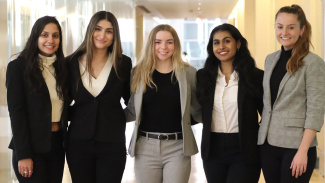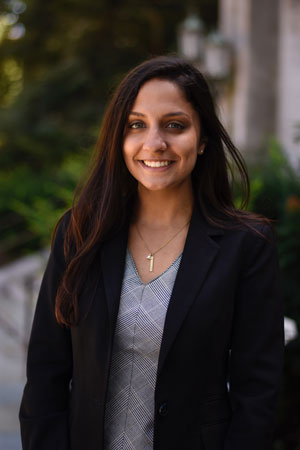cROSSroads: A Woman in Business School — And Beyond

Growing up, I attended an all-girls school called Hathaway Brown, which ran from preschool to my senior year of high school. I loved my school and truly felt like it prepared me for a lifetime of success. Most importantly, HB made me feel like I was capable of anything and the sky was the limit.
This article was originally published on Poets&Quants.

It was not until I started applying to colleges when I realized the significant gaps between men and women in some fields. I remember looking across a number of schools and being surprised at the enrollment divide between the sexes in business and STEM majors.
While I was first intimidated by these statistical gaps, I decided not to let them stop me from trying these fields for myself. When touring the Ross School of Business, I connected with a BBA Ambassador, one of the on-campus student tour guides. I asked what her experience was like in a predominantly male space like business school. Four years later, I still remember how she shared her own nerves going into business – and how Ross quickly made her feel comfortable and a valued member of the community. She shared how, during her freshman year, she was paired with multiple female mentors through classes and student organizations. Here, she was able to lean on other women in the school while also finding out about opportunities women like herself could undertake. She also called over another BBA Ambassador who shared how she had women’s group chats in some of her organizations that were dedicated to helping women lift each other up and support one another. Unlike other schools, the BBA Ambassadors gave me specific instances and resources for women like me to succeed in a major and industry that was overwhelmingly male-dominated.
Find spaces where people believe in your success
Just a few months after visiting campus and talking to Ross students, I had the opportunity to experience it for myself as a first semester freshman. Immediately, I recognized the level of diversity in my classes. In an introduction to business class called BA100, students are organized into teams made up of six students, with an upperclassman designated as the peer mentor. My team consisted of three women. Admittedly, Ross, like other business schools, struggled with a balanced class between all genders; however, looking around the class, I noticed a more equal split than I had expected. During breakout activities with our teams, such as participating in a virtual business simulation, I felt comfortable to share my ideas with my teammates, even though I had no prior business background. During class-wide discussions in BA100, as well as other freshmen Ross courses such as Business Communications (BCOM) 250, I could tell other women felt comfortable to share their ideas. My worries of classrooms not representing who I am, or not having students that shared similar identities as me, quickly dissolved.
It was not only within the classroom where I felt Michigan Ross’s commitment to their diverse students. Within the first few weeks of school, I joined different affinity groups to connect with more women. Michigan Business Women, a Ross student organization, connected me with women across a range of ages to better understand their experiences and achievements breaking into business. Other affinity groups my peers joined include Out for Business, Black Business Society, and Arab Business Society.
Michigan Business Women introduced me to other on-campus opportunities such as the Och Initiative for Women in Finance and Co-Next. Founded and funded by Jane and Daniel Och, the Och Initiative consists of recruiting Treks open to any female Ross student. The Treks run in major cities including New York, Chicago, and San Francisco. In the process, they give female students the opportunity to meet with female leaders at major companies and learn more about how they progressed throughout their career. By engaging with other female Ross alumni, students are also able to build their networks and even find internship opportunities on these Treks. Other programs through Och include technical workshops on private equity, corporate finance, investment banking, and other finance areas as well as engagement with campus programs such as MBAs.
Another example is Co-Next, a women’s recruiting event where companies come to campus to connect with more women looking for opportunities. While career fairs occur often at Michigan, Co-Next is dedicated to connecting women from large, male-dominated companies such as Salesforce and American Express to students who may be interested in available positions.
While I was not actively searching for an internship, I remember attending Co-Next my freshman year and meeting so many Ross alumni who had successfully secured positions in male-dominated spaces. At the fair, campus recruiters gave me tips on my resume and cover letter as well as technical knowledge I could prepare when applying in the future. I remember talking to a campus recruiter for the first time, a woman from Salesforce, who was my first introduction to business and tech opportunities available to me. She mentioned some of the tasks analysts do, such as code, implement technical programs, and teach others around the company how to utilize new software. Some of these responsibilities sounded interesting to me. Eventually, they inspired me to look into a dual degree in the School of Information at Michigan, which I will be completing along with my Business degree this May. While I am not actually working for that company, I found this interaction to be a pivotal point in my college career. It showed me what opportunities looked like after college and what I could explore inside the classroom to figure out whether those opportunities are aligned with my goals.
Leverage opportunities to pave paths for others
Through on-campus company visits and alumni emails from employers, I have been able to participate in a number of female-focused corporate diversity events. One of my favorite experiences was through the Forté Foundation, a leadership organization dedicated to building a community of women in business sectors to learn from and support each other. Here, I joined other Michigan students in connecting with industry leaders at JP Morgan, Bloomberg, and several more financial institutions. During the trip, I met more Michigan students who were also interested in finance. We became close quickly and even made a groupchat, which we would later use to help each other with a range of professional activities such as recruiting for internships to socializing and making dinner plans. Forté also allowed me to expand my network beyond Michigan. At their conference, I was able to meet students from business schools such as Wharton and Cornell and liberal arts students from schools such as the University of Chicago. This broadened my network and introduced me to people I would later see at other women’s conferences, workshops, and internships.
Given Michigan Ross’s strong reputation and extensive alumni network, many companies visit campus to give live presentations and interviews to students. During my second semester of sophomore year, I attended a number of presentations from banks like Evercore and Morgan Stanley. At first, I was intimidated at attending these sessions. However, attending them with other women I met through women-focused affinity groups at Ross made me more confident to walk in and engage with the company. These companies also offered on-site diversity workshops where companies flew us out to see their offices, meet people at the firm, and participate in interviews. I was able to visit numerous companies through these programs and even meet women from other schools who were also interested in finance.
For example, I attended the Young Leaders Diversity Program at Moelis & Company in March of my sophomore year. They flew six of us Michigan students out to New York City, where we were able to meet with current analysts, associates, and vice presidents who had also graduated from Michigan. The program also brought in a range of speakers such as bankers like Ken Moelis and female leaders such as Deborah Borda of the NYC Philharmonic. During this experience, I was able to learn more about positions after business school as well as tips on how to succeed as a newcomer in any industry.
Ultimately, the opportunities provided to me at Michigan Ross helped me find women both in school and alumni at companies. They helped me secure internships at Oaktree Capital Management and The Raine Group, and a full-time role at Goldman Sachs. Even more, they made me feel comfortable and confident when working the job. While I am sad to be leaving Ann Arbor this spring, I am so fortunate that Michigan has provided me with the resources I need to succeed as a woman in finance and the greater business community.










